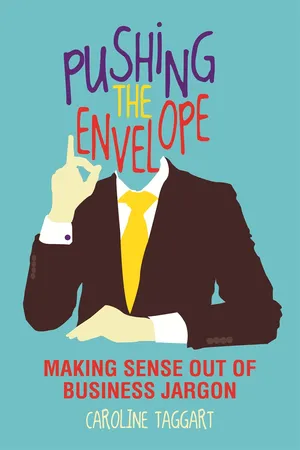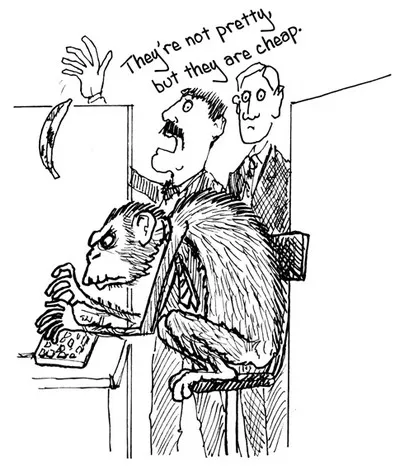![]()
1
Considering your
position
GETTING A JOB, LEAVING A JOB AND
THAT AWKWARD BIT IN BETWEEN
There’s jargon attached to interviews and recruitment and jargon attached to getting rid of people. There’s also a lot of jargon attached to actually doing the job, whether it’s sitting at your desk getting on with it, being positive at meetings or trying to keep in with your boss. This chapter considers some of the strange language we use to cover all these situations.
Brain dump
‘To dump’ in the sense of ‘to copy data to another, usually external, location for security or back-up purposes’ has been around since the 1950s, and it is this meaning that has been adopted into the ‘brain dump’. It’s a useful concept if you are leaving a job: you want to download everything pertinent that is in your brain and leave it in a form that your successor can absorb. However, lurking in the subtext of this expression is the idea that you are glad to be getting out, frankly past caring, and the result is a haphazard collection of the sort of stuff you might have produced if you were interpreting the word ‘dump’ in quite another way. Or, indeed, if there were an ELEPHANT IN THE ROOM.
Brownie points
When I was in the Brownies, you didn’t get points; you got badges for achievement in various fields such as cookery or starting campfires without endangering life and limb. No matter. Brownie points is the expression that entered the language about fifty years ago; to gain them means that in some way you have successfully sucked up to the boss and will be viewed more favourably from now on. Brownie points are nothing to do with KPIs or any of the other ‘measurables’ so beloved of management consultants (see DASHBOARD) – they are by definition nebulous and may be awarded or withdrawn at any time.
Close of play
One of only two expressions in this book to derive from cricket (see a SAFE PAIR OF HANDS for the other), this has been adopted into the working world to mean ‘the end of the working day’. Which is, of course, what it means in cricket. Some people in the office context say ‘end of play’, making any cricket aficionados wince.
Considering your position
In business or politics, this is almost always followed by a resignation. Considering your position is something you have to do when the management has MOVED THE GOALPOSTS, DOWNSIZED your department or otherwise made it clear that they are thinking of LETTING YOU GO. If you are in the public eye, it is possible that you have done something scandalous and no one is prepared to DRAW A LINE UNDER IT. Whatever the circumstances, you are likely to be spending more time with your family in future.
Cubicle monkey
As early as 1682 a monkey could be ‘a person engaged in any of various trades and professions, especially one performing a subordinate or menial task, or one which involves physical agility’. The oldest usage in this sense is ‘powder monkey’, meaning someone carrying gunpowder from the store to the guns themselves, particularly on a warship. Later there were grease monkeys, who mended cars and got covered in grease; bridge monkeys, who built bridges; and road monkeys, who repaired logging roads. In the US in the nineteenth century, ‘monkey’ was also thieves’ slang for an associate or just a man, an unknown and uncared-about stranger. In Britain there was the organ grinder, whose less skilled companion was – literally – a monkey.
Take any combination of these attributes and remove the positive qualities of those born in the Chinese Year of the Monkey: liveliness, ambition, opportunism and entertainment value. Put them behind a low partition in an open-plan office and, hey presto, you have a cubicle monkey: an unappreciated functionary performing an endless stream of routine tasks. If you feel such a creature needs sustenance at any time, refer to the entry on MUSHROOM MANAGEMENT for advice on its diet.
Ducks in a row
In American bowling terminology, a duck or duckpin, first recorded in 1911, is ‘a small pin shorter than a tenpin but proportionately wider at mid-diameter’. When you line such pins up – in a row – you are ready to bowl at them. If you do the same thing metaphorically, you have everything neat, tidy and organized. Your arrangements are completed, your in-tray and in-box are under control, your filing is done, goodness how your colleagues must hate you.
Elephant in the room
Here’s an expression that has evolved in an interesting way over the last fifty years. The OED’s earliest citation, from the New York Times in 1959, is ‘Financing schools has become a problem about equal to having an elephant in the living room. It’s so big you just can’t ignore it.’ However, in modern usage, the whole point of an elephant in the room is that you do ignore it. It’s too big, too uncomfortable, too controversial to be other than pussyfooted around. Until, of course, you all realize that you are up to your necks in sh*t.
If, by the way, anyone looks blank when you suggest there is an elephant in the room, don’t be tempted to tell them that this is an idiom. They’re only waiting for the chance to ask whether the idiom elephant is the one with the small ears or the large ears.
Entry level
The earliest use of this dates from the 1950s and refers to the basic level at which a job or academic course may be entered and the minimum qualifications or experience required. At entry level, you might be given a job for which you had no obvious qualifications, perhaps because you were of GRADUATE CALIBRE and were deemed to have potential; in such circumstances you would receive suitable training or supervision rather than being expected to HIT THE GROUND RUNNING. From this, the use of ‘entry level’ has expanded to describe a product or activity suitable for a beginner: an ‘entry-level computer’ would be USER-FRIENDLY to the technologically challenged, while an ‘entry-level adventu...










